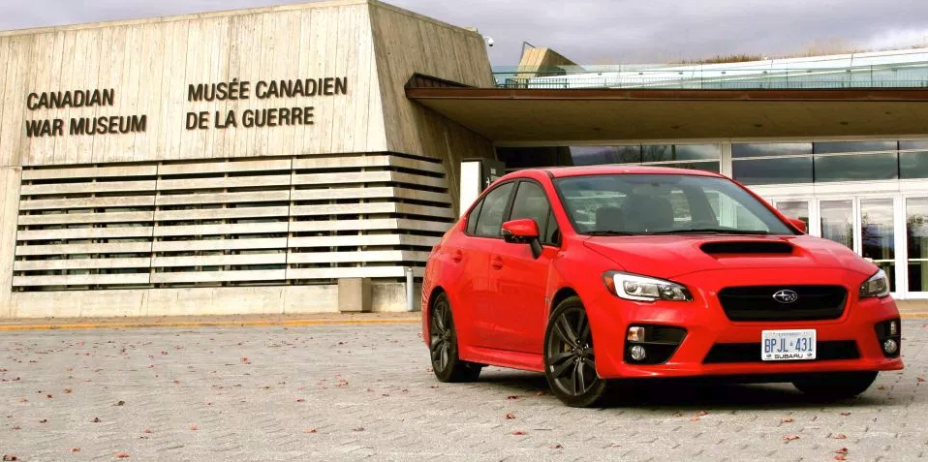Long-Term Test: 2016 Subaru WRX CVT – Part 3

Story and photo by John LeBlanc
As much as we enjoyed flogging our 2016 Subaru WRX CVT around a race track in our last installment, the remaining 99.9 percent of the time in our long-term tester has been what the typical buyer might experience on a day-to-day basis.
And although our $39,045 (including freight and pre-delivery inspection fees) all-wheel-drive Subaru WRX CVT Sport Tech – including its bevy of spoilers, air vents, big wheels, performance tires and a powerful turbocharged engine – can act like a sports car when called upon, there’s a practical, foul-weather-friendly $21,645 Subaru Impreza four-door sedan lurking underneath.
Unlike a true sports car, such as Subaru’s own BRZ, the WRX can fall back on its five-passenger Impreza sedan roots when you aren’t trying to set lap times at your local race track. So as we asked in our introductory story: Can a hardcore sports compact like the 2016 Subaru WRX CVT cut it as a daily driver?
Like its exterior suit, the WRX sedan’s interior design borders on the conservative. In absence of any floating iPad-like screens (see Mazda3) or over-buttoned panels (see Ford Focus), the Subaru’s controls are relatively common in layout and ergonomics. That said, all the pieces feel high-quality and are especially well screwed together with tight panel gaps – a big improvement over cheaper-feeling Subaru compacts from the past.
And if you want to carry more than yourself and a companion, it’s good to know that the current Impreza-based WRX sedan is now roomier than ever.
Up front in the driver’s seat, the Subaru’s head- and legroom are well above average for the segment. We also like its well-thought-out driver’s position, where the steering wheel, CVT gear lever and pedals felt just right. The result is a sporty car that can also be a friend for long hauls. During a one-day, back-and-forth road trip from Ottawa to Toronto, I found the WRX’s supportive seats truly comfortable for the 10 hours behind the wheel.
During our first 45 days in the Subaru, we also discovered that it was a great vehicle for family errands, like picking up birthday balloons, or random trips to the hardware or grocery stores.
In the back, our ever-growing preteen daughter and her ringette teammates found the WRX’s rear seat accommodations more comfortable for long trips to the rink than the Mazda3 or Ford Focus testers we’ve recently had in our laneway. And for sports gear (or other belongings), the Subaru’s rear trunk space is also generous, measuring 340 litres. Plus split/fold-down rear squabs add additional space when you need it.
Like many of its Japanese rivals, Subaru has been slow to offer an all-in-one infotainment package. But when you check-off the Sport Tech option on the WRX, you get the latest version of Subaru’s Starlink system that includes a larger 7-inch touchscreen display (a 6.2-inch is standard) with GPS navigation system in the middle of the dash.
Via Starlink, WRX owners can connect their mobile devices to access multimedia content through various apps. Once installed, you’ll find a variety of digital content such as music, news, weather and a calendar feature through your device and the infotainment system’s touchscreen.
Overall, all the features and systems in our WRX worked just fine. And there were no complaints from the Taylor Swift fans in the household when the 440-watt Harman Kardon nine-speaker audio system was employed.
That said, the capacitive nature of Subaru’s touchscreen caused some unwanted commands when the driver would reach for the right-hand knob to adjust audio channels – plus, those knobs need to be bigger. A console-mounted central controller system, like in the Mazda3, is a more efficient design.
While the 2016 Subaru WRX’s taut suspension is near perfect for back-road blasts or track days, the stiff ride may be annoying for buyers looking for a more comfortable daily ride. Same thing goes for the sports compact’s exhaust: it’s been tuned for a sound that drivers will say is “sporty” but passengers may call “loud.”
And just as its standard AWD system makes the WRX handle exceptionally well, its inherent safety in a country with four distinct driving seasons is also one of the biggest reasons why Subarus are becoming more and more popular with Canadians addicted to all-wheel drive.
On the other hand, we’re also seeing relatively good fuel economy numbers in our 60-day WRX. It’s rated at 12.5 L/100 km in the city and 9.5 on the highway, but the car’s computer is reporting an average of 9.2.
In addition to standard AWD, Subaru also ups the safety ante further by making stability and traction control, antilock disc brakes, front seat side airbags, side curtain airbags, a driver knee airbag and whiplash-reducing front head restraints, with a rearview camera standard on all models. The end results are impressive.
In U.S. government crash tests, the Impreza-based WRX received five out of five stars for overall crash protection, with four stars for total frontal-impact safety and five stars for total side-impact safety. The Insurance Institute for Highway Safety awarded the Impreza its highest rating of “Good” in the moderate-overlap frontal-offset, small-overlap frontal-offset, side-impact and roof-strength crash tests. Plus the Subaru’s seat/head restraint design was also rated “Good” for whiplash protection in rear impacts.
So yes, keen drivers will be attracted to the 2016 Subaru WRX for its ability to behave like a two-seater sports car. But the roomy, practical, well-built and safe Impreza sedan underneath can make the sports compact a satisfying vehicle as a daily driver, as well.




